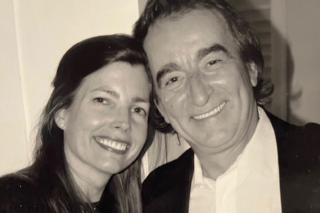When Jim Corcoran, Associate Professor Emeritus died of neck cancer in 2021, he left a 35-year legacy of teaching students in Communications at Simmons. Thanks to the support of many donors and the work of his wife, Carolyn Shute ’88 ’91MA, the James P. Corcoran Scholarship has been established to honor that legacy, in perpetuity.
Shute recalls that Corcoran discussed creating a scholarship, though he hadn’t specified that he wanted one in his name. By the summer of 2021, Corcoran’s cancer had metastasized. “That’s when I started thinking about the scholarship,” says Carolyn Shute, Corcoran’s wife of 13 years.
Although Corcoran grew up in North Dakota and attended Harvard Kennedy School, Shute decided that Simmons was the right place for the scholarship in Corcoran’s name. “He taught at Simmons for 35 years, and was on the East coast for longer than he was in North Dakota,” she notes. “We met at Simmons, and he believed in the power of educating women. I knew that Simmons was the right place.” She also felt strongly that the scholarship specifically benefits students in the Communications Department, where Corcoran taught. “On his birthday [in August 2021], I told him I was setting up the scholarship for him and hoping to get it endowed,” she recalls. “He was thrilled.”
Corcoran passed away in October of 2021. Donations to the scholarship began coming in, but Shute had a specific goal in mind. If the fund could reach $100,000, the scholarship would be endowed; meaning, it would be given to a student every year, in perpetuity. Shute spoke to Advancement staff to discuss tactics for raising the funds — the use of social media, or planning fundraising events — but she chose a different direction. “It essentially became a letter-writing campaign,” says Shute. “I made a list of everyone I thought might donate, then divided those lists into groups.” Those groups encompassed family, friends, and colleagues from Boston, Jim’s home state of North Dakota, and many points in between. “I chose particular people from each group who had already made donations, and asked them to send letters [to others on the list] as ambassadors for his scholarship.”
In this way, the fund was a community effort. The letter-writing approach was fruitful, in addition to a “word of mouth” component, particularly among Jim’s friends at the Kennedy School. “A couple people were instrumental in getting some money through the conversations they had with friends,” she says. That said, it was nerve-wracking. Shute recalls being “on tenterhooks, a little bit, wondering if I would get the endowment. But I did, and it’s very exciting. The scholarship will be given for the first time in the fall.”
For Shute, the project assisted in processing her loss. “Grief is ongoing, and it can be all-consuming,” she says. “It gave me something to do that felt satisfying and important, and I felt that Jim would appreciate it.”
Shute herself earned her Bachelor’s degree in English from Simmons in 1988. After taking a survey course in Children’s Literature with the late Professor Emerita Susan Bloom, she was hired as a staff assistant for Bloom over the summer. “I didn’t want to give up that job,” says Shute, who finished her undergraduate degree part time, and then decided to get a Master’s degree in Children’s literature in 1991. She met Corcoran at Simmons in 1995.
“Simmons meant a lot to Jim,” she says. “He gave taught students to think critically and write with skill. The world is a very complex place, and [he gave them the skills] to start sorting through the decisions that they would have to make in their careers and their daily lives.”
In a feature in the May 2022 issue of CommTracks magazine (a publication made by the Communications Department), written by Alyssa Stevens ’22, Isabelle Indelicato ’23 said that Corcoran “taught me how to think critically, be curious, and write with integrity.”
Corcoran’s Simmons legacy extends well beyond his students. “As a tenured member of the faculty, he was a champion of untenured faculty. He stood up in meetings and was their voice, when they felt they couldn’t speak on their own. He got a reputation for doing that — he was committed to his students and his faculty. He had a lot of passion for Simmons.” Shute cited a quote from humorist Finley Peter Dunne as an encapsulation of Corcoran’s career and approach: “The job of the newspaper is to comfort the afflicted and afflict the comfortable.” This was evident also in his book, Bitter Harvest (Viking, 1990), addressing one of the earliest instances of domestic terrorism in the American Midwest, which still resonates in the current political climate.
It was while writing Bitter Harvest that Corcoran took a teaching position at Simmons, where he intended to stay for a year. “[At Simmons], Jim discovered he liked to teach,” says Shute. “I’m not sure when he decided to stay at Simmons permanently, but I once asked him if he ever wanted to go back to North Dakota, and he said no. He liked to visit his family and friends [in North Dakota], but he never wanted to return. That’s another reason his scholarship is here. All roads lead back to Simmons.”
Support Corcoran’s legacy and Simmons students by contributing to The James P. Corcoran Scholarship Fund in Communications.

